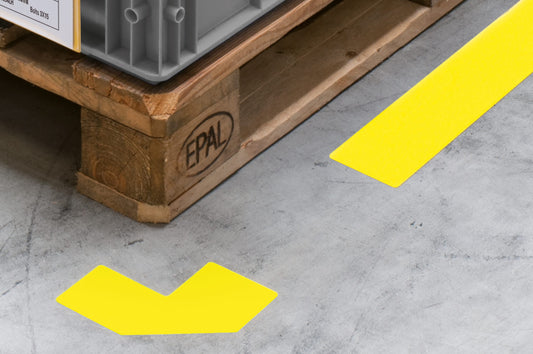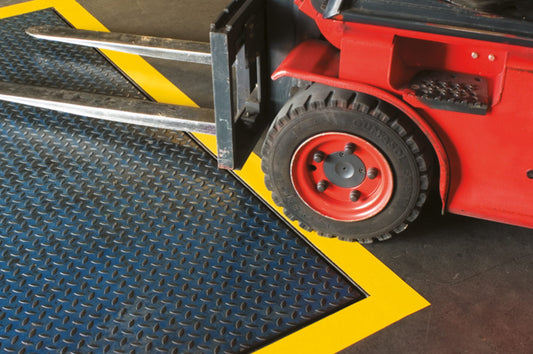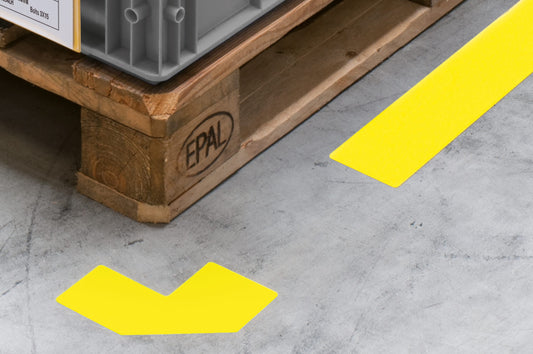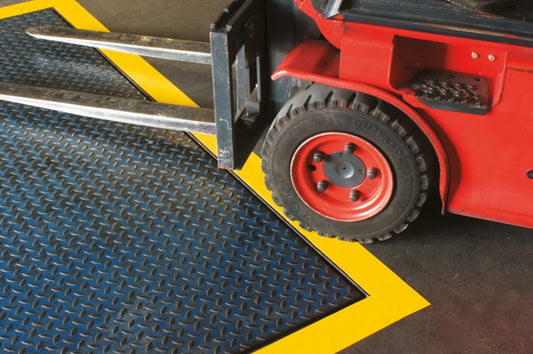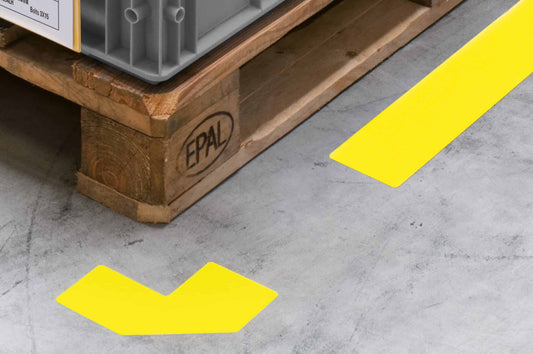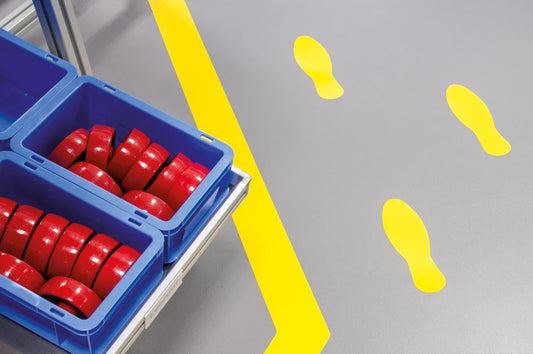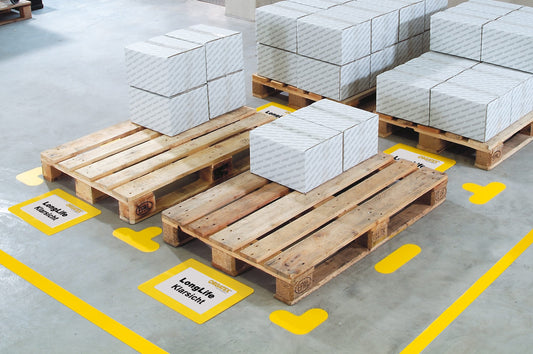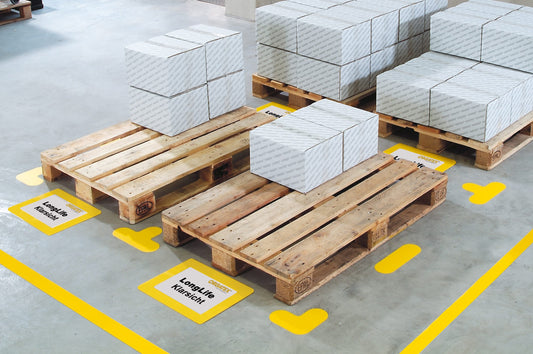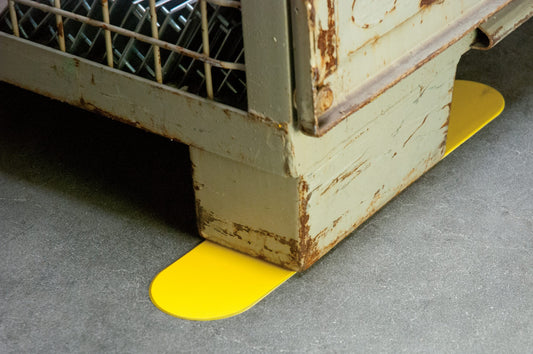In modern logistics platforms and administrative environments, efficiency and safety go hand in hand. One of the most effective ways to achieve both is through warehouse line marking. The use of durable, visible floor markings that define pathways, storage areas, hazard zones, and workflows. These markings are more than visual cues; they are an integral part of workplace safety systems, lean manufacturing, and regulatory compliance.
Whether you manage a busy distribution centre, a production facility, or an administrative hub with storage requirements, floor markings help you create order, protect employees, and optimise productivity. At ORGATEX UK, we provide a comprehensive range of floor markings and warehouse floor markings from adaptable floor marking tape to long-lasting modular systems and floor marking symbols.
What is Warehouse Line Marking?
Warehouse line marking refers to the strategic application of coloured lines, shapes, and symbols on facility floors to improve safety and organisation. Typically made from durable adhesive tape or modular components, these markings are designed to withstand the heavy traffic of forklifts, pallet trucks, and footfall in industrial and logistics environments.
At its core, warehouse line marking provides visual management. By communicating essential information instantly and without words, it reduces errors, improves compliance, and keeps operations running smoothly.
What Are the Benefits of Warehouse Floor Markings?
Before diving into the different types of markings, it’s important to understand why they matter. Here are the main advantages:
- Enhanced Safety: By visually separating pedestrian zones, vehicle lanes, and hazardous areas, warehouse line markings reduce the likelihood of collisions and accidents.
- Operational Clarity: Teams instantly know where materials should be stored, where machinery should operate, and where walking routes are safe.
- Regulatory Compliance: The Health and Safety Executive (HSE) recommends clear visual cues as part of workplace risk management. Floor markings help businesses demonstrate compliance during audits.
- Support for Lean Manufacturing: As part of 5S and other lean tools, floor markings reinforce standardisation and order, eliminating wasted time and confusion.
- Long-Term Cost Efficiency: High-quality markings last longer and reduce the downtime associated with repainting or frequent replacement.
By implementing floor markings consistently across your facility, you create an environment that is safer, easier to navigate, and more productive.
Types of Warehouse Floor Markings
Warehouse floor markings come in several forms, each with unique advantages depending on your facility’s layout, traffic levels, and operational needs.
Floor Marking Tape
Floor marking tape is one of the fastest and most flexible options available. It is ideal for facilities that need to change layouts regularly or for businesses seeking a quick, low-disruption solution. Our heavy-duty tapes are designed for high visibility, easy application, and excellent adhesion. They resist abrasion and chemicals, ensuring they remain effective even under forklift traffic.
Longlife Modular Floor Markings
For a more permanent solution, our longlife modular systems provide exceptional durability. Unlike paint, modular markings can be installed quickly without downtime and can withstand years of intensive use. They are particularly suited for areas with high forklift traffic, making them a long-term investment for logistics facilities.
Floor Marking Symbols
Symbols are powerful because they transcend language barriers. Our floor marking symbols include arrows, footprints, hazard indicators, and other designs that instantly communicate meaning. They are essential for guiding workers and visitors and for reinforcing safety standards in line with HSE recommendations.
Rounded Longlife Symbols
For environments requiring both strength and aesthetics, our rounded longlife floor marking symbols combine durability with professional design. They are especially useful in high-profile areas of a facility where presentation is as important as performance.
Each of these solutions can be tailored to your facility’s needs, ensuring that your warehouse floor markings remain clear, durable, and effective.
Best Practices for Applying Warehouse Line Markings
The success of warehouse line marking doesn’t just depend on the product chosen — it also relies on correct planning and application. Following best practices ensures your investment delivers long-term benefits.
1. Assess Facility Needs Before Installation
Before installing markings, conduct a thorough analysis of workflows. Identify areas of heavy footfall, vehicle traffic, storage, and safety hazards. A clear plan will prevent confusion and wasted materials.
2. Select the Right Materials
Tape is perfect for flexible layouts or temporary requirements, while modular systems offer unmatched durability in permanent high-traffic areas. Selecting the right material ensures your markings last as intended.
3. Prepare Surfaces Correctly
Floor surfaces should be clean, dry, and free of dust or grease. This step is critical for proper adhesion and prevents premature wear or peeling.
4. Use Standardised Colours and Shapes
Consistency across the facility ensures everyone understands markings instantly. For example:
- Yellow for pathways and aisles
- Red for hazards or prohibited areas
- Green for safe zones or emergency equipment
- Blue for administrative or designated storage areas
5. Maintain and Inspect Regularly
Markings should be inspected routinely to ensure they remain clear and intact. Replacing worn or damaged sections maintains both safety and compliance.
By following these steps, businesses maximise the effectiveness of their warehouse line marking and create a safer, more efficient environment.
Warehouse Line Marking in Lean Manufacturing
One of the most valuable applications of warehouse floor markings is within lean manufacturing and the 5S methodology (Sort, Set in Order, Shine, Standardise, Sustain). Floor markings visually support each stage:
- Sort: Mark unwanted or waste areas clearly.
- Set in Order: Define storage zones and pathways for easy access.
- Shine: Keep designated areas clean and visible with high-contrast markings.
- Standardise: Use consistent colours and symbols across the site.
- Sustain: Maintain markings to reinforce discipline and long-term order.
Durability and Lifespan of Floor Markings
Warehouse environments can be tough on any floor system, so durability matters. On average:
- Floor marking tape lasts 12–24 months in moderate traffic areas.
- Longlife modular systems can last several years in demanding environments with constant forklift use.
- Symbols and shapes retain visibility and adhesion for years, even under intensive industrial use.
The exact lifespan depends on floor conditions, traffic, and maintenance practices. By choosing high-quality ORGATEX solutions, businesses benefit from reduced replacements and long-term cost efficiency.
Why Invest in Warehouse Line Marking?
Warehouse line marking is far more than a regulatory tick-box exercise. It is a proven method for making logistics platforms and administrative environments safer, more efficient, and more organised. From reducing accidents to streamlining workflows, the benefits are immediate and long-lasting.
At ORGATEX, we specialise in durable, high-performance marking solutions including floor marking tape, symbols, and longlife modular systems. Each product is designed to withstand industrial demands while delivering clear, visible guidance for employees and visitors alike.
By choosing the right warehouse floor markings and applying them strategically, your facility can operate with greater safety, compliance, and productivity. When the floor is marked with clarity, the entire organisation moves with confidence.


